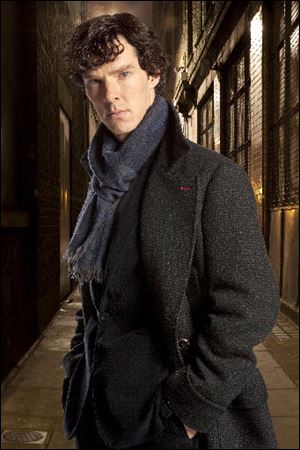
PBS offers superb update on Sherlock
10/22/2010
Benedict Cumberbatch portrays Sherlock Holmes in ‘Sherlock,' a contemporary take on the legendary Sherlock Holmes crime novels, set in present-day London.
He's already graced the screen, large and small, more than 200 times, so the news that the BBC planned to bring Sherlock Holmes to TV again didn't exactly inspire confidence — especially in the wake of last year's underwhelming Sherlock Holmes-meets-Die Hard action film from Guy Ritchie and Robert Downey, Jr.
But five minutes into the BBC's miniseries, Sherlock, which will premiere at 9 p.m. Sunday on PBS' Masterpiece Mystery!, and the whole household was weeping with joy. Even the cat was moved.
Sherlock will air in three feature-length episodes Sundays through Nov. 7, locally on WGTE-TV, Channel 30.
Created by Steven Moffat and fellow Doctor Who writer Mark Gatiss, Sherlock is by far the best Holmes adaptation since fan favorite Jeremy Brett inhabited the role in Granada's series in the '80s and early '90s.
And all this, despite — or perhaps, because — the new Sherlockis set in the 21st century.
Moffat dismisses purists alarmed at the idea of a laptop-toting Holmes who communicates by text on a top-of-the-line PDA — and whose adventures are chronicled not in Strand Magazine, but on a blog.
“We were confident — well, as confident as you can be — that we had a unique take on [the story] and we could do it well,” he says.
“The question isn't ‘Why update Sherlock Holmes?' — The question should be ‘Why not?'”
After all, he says, Basil Rathbone's famed Holmes film series was set during WWII.
“If you set it in the Victorian era, you'll inevitably prioritize the costume drama ... and lose the story,” he says.
Sherlock's badly socialized eponymous hero is played by Benedict Cumberbatch (The Last Enemy), whose inspired performance nicely balances the towering stature and equally impervious British reserve of Rathbone with the more maniacal, neurotic fervor invested in the role by Brett, who suffered from bipolar disorder in real life.
Cumberbatch says he grew up watching the Granada adaptation with his mother, actress Wanda Ventham, who was friends with Brett.
“We would watch it together and I would be glued. ... I was probably too young to understand the sophistication of what was going on.”
Cumberbatch eats up the role. When we first meet him in the pilot, A Study in Pink (a loose adaptation of Doyle's A Study in Scarlet), he's vigorously hitting a corpse with a switch — to study postmortem bruising.
Accused of being a psychopath in another memorable scene, Cumberbatch's Holmes explains that he's actually a “high-functioning sociopath.”
Yet, perhaps more than most previous versions, Sherlock isn't a “one-man show,” says Cumberbatch, but a story about the growing friendship between Holmes and his closest (his only?) friend, retired Army doctor John Watson (Martin Freeman), who was wounded in action in Afghanistan.
Freeman and Cumberbatch, whose characters first meet in the pilot, are electric on screen.
“Chemistry is so mysterious,” Cumberbatch says, almost rhetorically. “It just happened with us.”
Moffat says he auditioned dozens of actors before he found Cumberbatch's match in Freeman. “Watson is not a genius, but he is the first man that a genius would trust ... incredibly competent and a truly good man,” he says.
“A heart to Sherlock's brain.”
The cast is rounded out by Rupert Graves as the oft-exasperated Detective Inspector Lestrade and show cocreator Gatiss as Sherlock's brother, Mycroft.
Gatiss lends a lovely edge of menace to his Mycroft, a high-ranking member of Britain's secret intelligence services. He's all cloak and dagger — and gun — with Watson, but regresses to an angry, jealous toddler when he's around Sherlock.
“We departed from the stories [with Mycroft],” Moffat says. “We didn't want Mycroft to be just a fat, lazy version of Sherlock.”
For all the changes, certain things remain eerily constant, says Cumberbatch, referring to Watson's backstory.
“[The original] Watson was wounded in battle in Kandahar [Afghanistan] in the 1800s,” he says, “and we're there again in 2010.”
Let's not forget Sherlock's archenemy, Professor Moriarty. His dark, mysterious presence is felt in the first two episodes, but you'll have to wait to see him.
If there's one complaint about Sherlock, it's over its hero's name: Holmes has always been addressed, by everyone including Watson, by his last name.
Here, he's just Sherlock.
Holmes ought to remain Holmes!
There are few moments in movie history quite as exhilarating as hearing an excited or baffled Watson exclaim, “Holmes!”